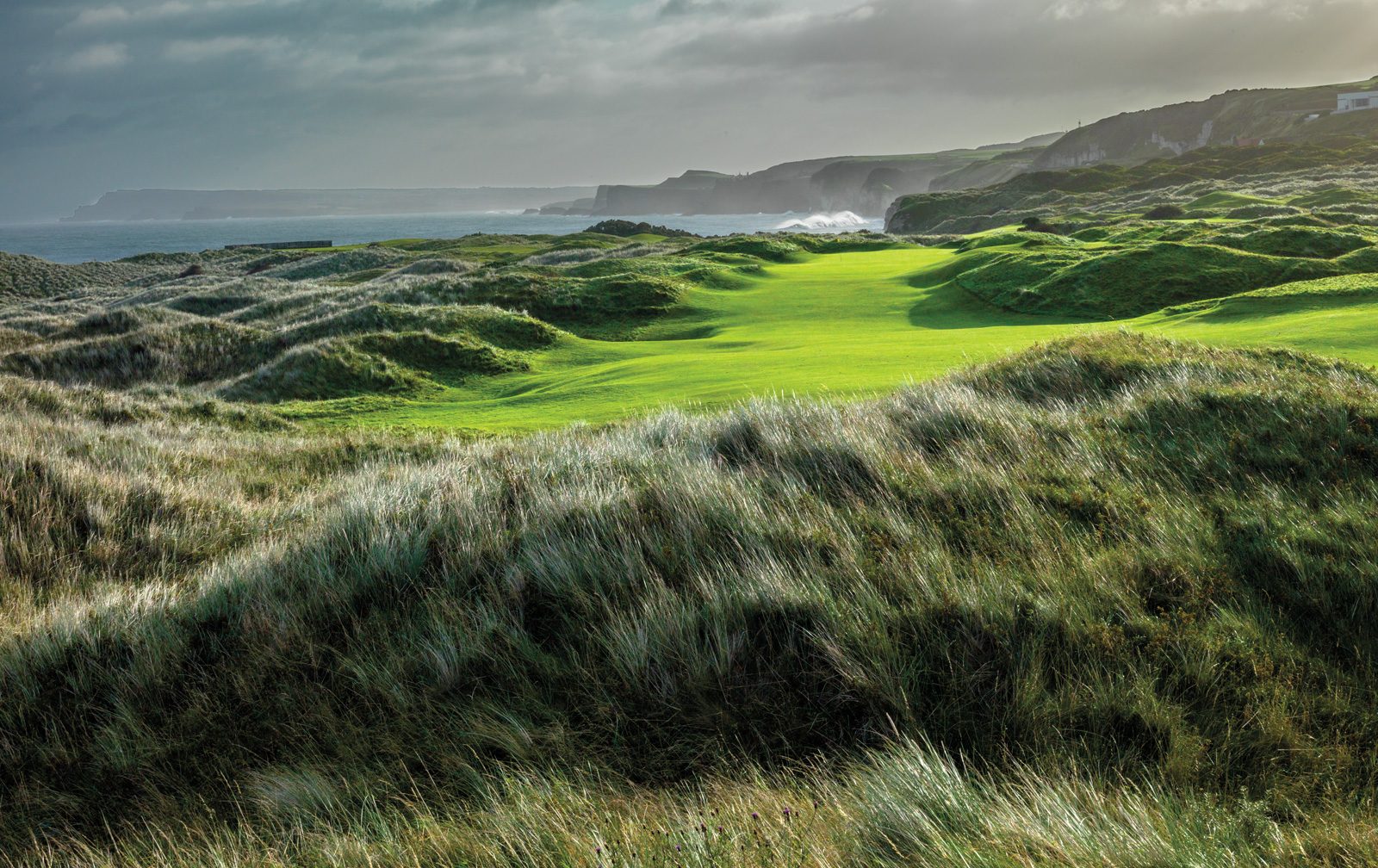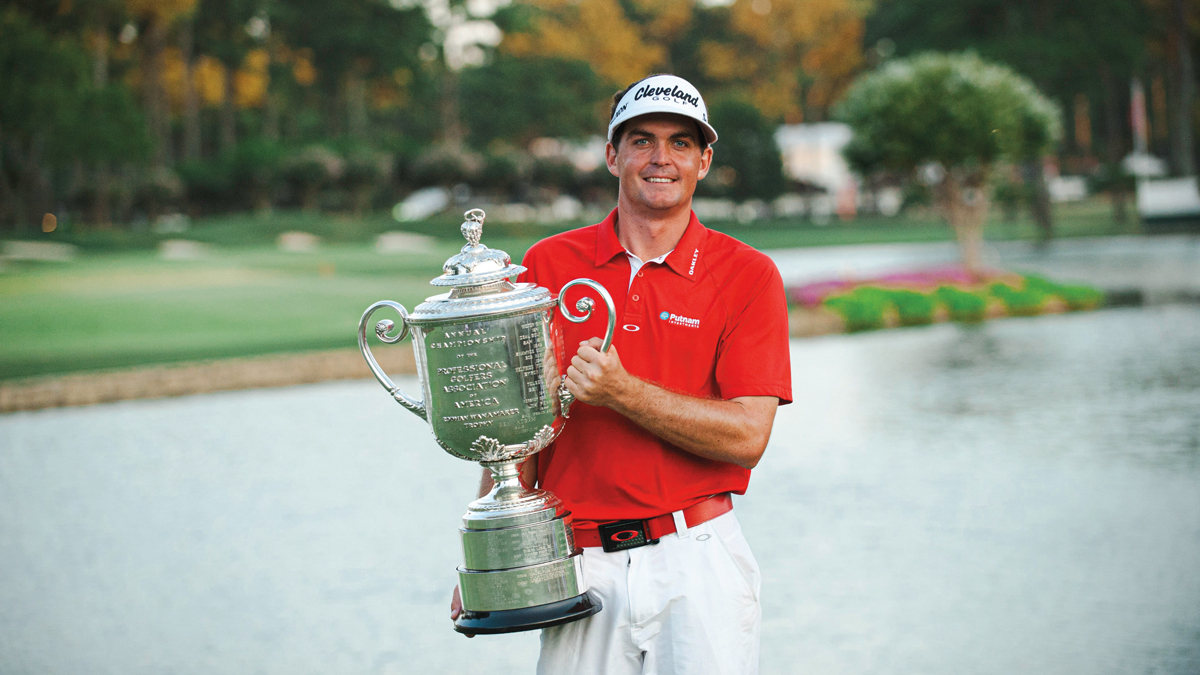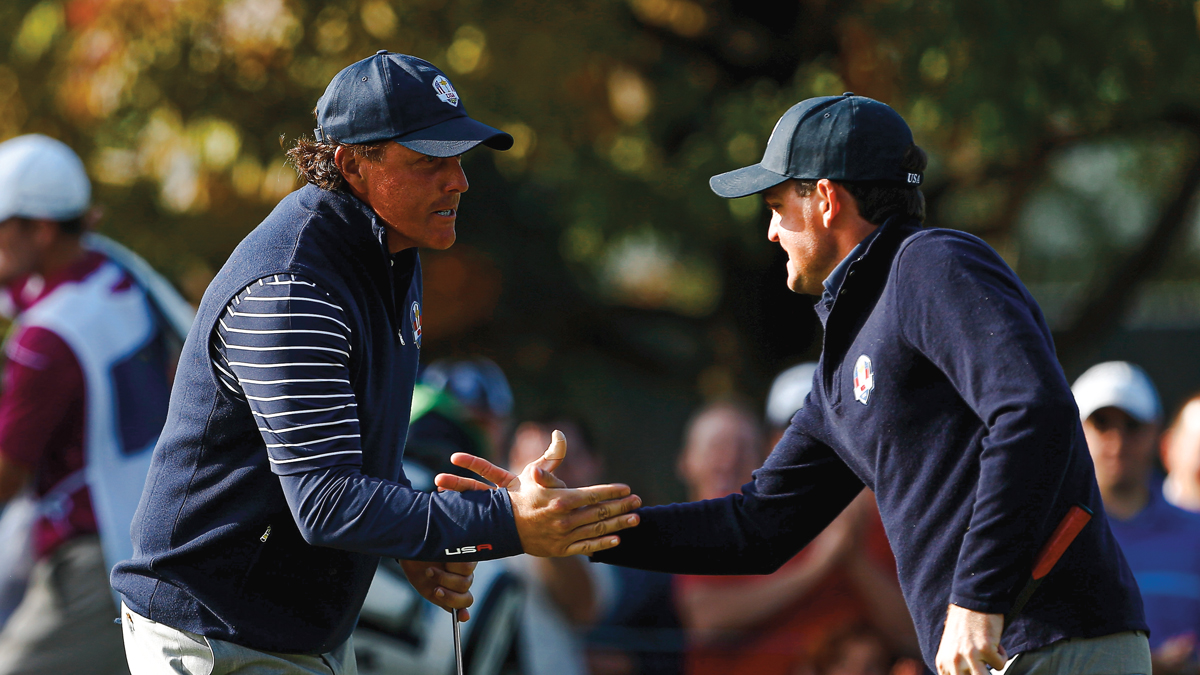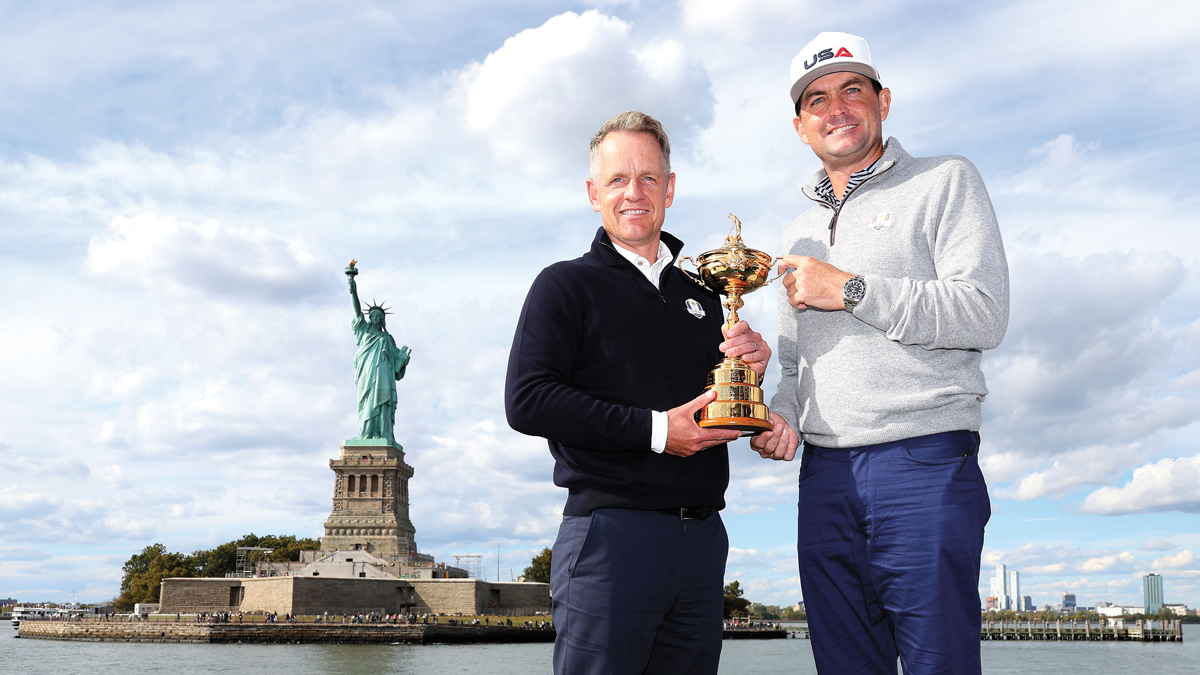
eegan Bradley burst onto the PGA Tour nearly 15 years ago, winning the Byron Nelson Championship at TPC Las Colinas in Dallas when the winds were gusting at more than 30 mph. The victory positioned the then 24-year-old as the frontrunner for that year’s Arnold Palmer Award (the PGA Tour’s rookie-of-the-year honor), but Bradley wasn’t done.
Buoyed by the $1.17 million that he pocketed at the Byron Nelson, Bradley qualified for the 93rd PGA Championship 10 weeks later. He opened with a 71, putting him in a tie for 36th place, but the St. John’s University alum channeled his Red Storm school spirit and posted three straight scores in the red, tying Jason Dufner for the lead after 72 holes. Just as he had done in Dallas, the native New Englander flaunted nerves of steel during the aggregate, three-hole playoff, besting Dufner by a stroke to claim the Wanamaker Trophy.
The milestone victory came seven years after Bradley had captained the Hopkinton Hillers golf team to a state championship in Massachusetts during his senior year of high school. And it had been a decade and a half since he had tagged along with his dad, then the head pro at Haystack Golf Course in southern Vermont, spending as many days as he could on the course.
“New Englanders are hard-working people, and we’re taught that you have to go out and earn whatever you get,” Bradley says. “I always had a really short season, so I had to make the most of every second that I had, every opportunity to physically play the game. I’ve always taken those New England roots with me.”
The summer after Bradley graduated from St. John’s, he turned professional, moved to Florida, and set his sights on the mini tours—first the NGA Hooters Tour (now the NGA Pro Golf Tour) and then the Nationwide Tour (now the Korn Ferry Tour). Arriving in Orlando, Bradley was strapped for cash, but that didn’t stop him from slapping down $2,500 for an annual membership at Rio Pinar Golf Club. “That was a huge stretch,” he acknowledges, “but the club had unlimited range balls. I still had that mentality that I needed to optimize every day. But all of a sudden, I was playing [and practicing] all year round, so I improved rapidly from there.

“No matter what, if it had to do with bettering my career,” he continues, “I would spend the money. I would just do it and sort of figure out the consequences later.”
As it turns out, Bradley’s brash investment in his game didn’t bring consequences, only rewards—early premiums that culminated with him hoisting the Wanamaker Trophy at Atlanta Athletic Club on a mid-August Sunday afternoon in 2011. Thanks in large part to that major victory, as well as his win at the WGC-Bridgestone Invitational the following year, Bradley qualified for his first Ryder Cup in 2012.
He and teammate Phil Mickelson dominated the morning foursomes on Friday and Saturday, winning 4&3 and 7&6, respectively. Bradley secured three points for Team USA that year, though the Americans squandered a four-point lead, allowing the Europeans to retain the cup. Two years later, Bradley was back at the Ryder Cup, this time as a captain’s pick—one that made a lot of sense given his existing rapport with Mickelson.
“Mickelson wanted to play with Keegan, and Keegan said, ‘Yeah, I’ll play with him. I understand him. I’ve practiced with him. I can deal with him,’ ” Davis Love III recalls of the early strategy sessions that he had as the American team’s captain during Bradley’s first Ryder Cup. “Somebody that Phil wanted to play with wanted to play with Phil. It was a match made in heaven.”
Bradley was indeed riding high, but after the 2014 Ryder Cup, he slipped into an eight-year stretch of frustrating results. The slump was influenced by the USGA and the R&A banning anchored putting strokes at the start of the 2016 calendar year. A switch to AimPoint only a couple of years ago has instilled a new dose of confidence in Bradley’s performance on the greens, and that’s translated to higher placements on PGA Tour leaderboards each weekend. Over the last two full seasons, Vermont’s most decorated golfer has racked up nine top 10s, including three runner-up finishes and three victories.
Bradley’s resurgence had many golf pundits predicting his inclusion on the 2023 Ryder Cup team as a captain’s pick. But Zach Johnson selected Sam Burns, Rickie Fowler, and Justin Thomas—three players who finished with fewer points. (Cameron Young and Bradley, who finished ninth and 11th on the points list, respectively, failed to make the team.)
“You can’t expect to be on the team if you don’t make it on points,” Bradley says. “If you have to rely on a pick, it’s out of your hands. You shouldn’t be disappointed.”
More than 18 months after taking Johnson’s fateful phone call and learning that he hadn’t made the team, Bradley can talk more dispassionately about hearing the news. But his understandable disappointment in that moment was evident during the sixth episode of the second season of Netflix’s documentary Full Swing, which aired during the first week of March 2024. “When I’m done and I’ve retired,” Bradley said earlier in that episode, a clip recorded while Johnson was still deliberating over his captain’s picks, “having a Ryder Cup win on my résumé versus a loss would be a huge difference for me.”

In 2014, when the European team bested the Americans in the final day of singles matches to retain the cup again, the clinching point was scored in Bradley’s match. “That was probably the lowest point in my career,” he revealed to Netflix, “and I would love to change that.”
Last July, the PGA of America presented Bradley with an opportunity to do just that, selecting him as the captain of this year’s Ryder Cup team. The appointment made Bradley the youngest American captain since 1963, when Arnold Palmer, then 34 years old, commandeered the U.S. squad to a decisive 23-to-9 victory, playing in six matches and winning four points along the way. Incidentally, Palmer was the last to lead a Ryder Cup team as a playing captain. Bradley isn’t ruling out that prospect for himself this go-around.
“I go out each year to try to win majors and make these teams,” he says. “It doesn’t matter [this year] if I’m the Ryder Cup captain; I’m trying to make the team just like the rest of the players are. I’m definitely getting older, especially with the way the golf world is now, and I just don’t know how many more chances I’m going to get to do this.”
Although it’s been more than 60 years since the Ryder Cup had a playing captain, Bradley doesn’t believe the era of having one is a thing of the past. “If Phil or Tiger wanted to do this when they were my age, they would’ve played. It’s just that no one’s really had the opportunity that I have,” he says. “I think it would be extremely difficult, but I’m gonna cross that bridge when it comes.”
Whether Bradley qualifies as a player or not, one thing is certain: When the Ryder Cup is contested at Bethpage Black in September, it will be a homecoming of sorts for the American captain. During Bradley’s years playing for St. John’s, the superintendent at Bethpage Black would let the golf team practice on the course every Monday, when it was closed to the public for maintenance. The team would essentially sneak onto the course by a maintenance facility near the third tee box, and they’d play 10 holes, beginning with the par-5 fourth.
When the weather was harsh in October and November, the course “felt like it played 9,000 yards,” Bradley says, but those covert practices, no matter the time of year, were instrumental in his development. The time spent on such a legitimate, major championship course provided a glimpse at what the pinnacle of competitive golf is like. In fact, Bethpage Black had hosted the U.S. Open only a few years earlier. “We would reminisce about the shots that Tiger had hit,” Bradley recalls, “and every time we would go, we would hit those same shots.”
As a student athlete, Bradley had to occasionally meet with counselors to talk through his career plans. “You weren’t allowed to say that you were going to be a professional athlete,” he remembers, even though that’s all Bradley wanted to do. He doesn’t remember the specifics of the lie that he would routinely tell, other than it was the idea of working for a professional sports team in some capacity. What he does remember is that he couldn’t bear the thought of such a scenario. “I used to have to curl my toes in my shoes to where it hurt just to even say it out loud. That’s how manic I was about all this.
“I didn’t come from a lot of money,” he continues, then quickly adds, “I didn’t come from any money. I didn’t have a family business to fall back on. I studied sports management, and I hardly did that. I had no other plan. This was it.”
These days, as a husband and father, Bradley is filled with anxiety when he thinks back to his cavalier attitude toward life after college. “It just dawned on me how I didn’t have even the slightest backup plan,” he says of one such recent moment of angst. “I didn’t have any other options other than to do what I’m doing now.”

The now 38-year-old also had another revelation about five years ago, one that focused on how he behaved on tour early in his career. “I felt like everybody out there was my enemy, like they were my opponents,” he says. “I never really let my guard down. That’s sort of a New England attitude—it’s me against the world. People would be nice to me, and I used to think, They don’t mean that. This is how sick I was. I was just so driven; I just wanted this so bad.”
Bradley is now playing his 14th year on tour, and, with that experience, he’s gained a fresh perspective, one that comes with the recognition that he needs to savor and celebrate positive moments. It’s an epiphany that he wishes he could’ve had more than a decade ago.
For a while, Bradley took a page out of Tom Brady’s playbook. Whenever the quarterback was asked to pick a favorite of the Super Bowl championships that he had won, Brady would always give the same answer: my next one. Bradley embraced a similar mindset, though he now realizes it was partially to his detriment. Take that Wanamaker Trophy that he won as a rookie: Bradley kept it hidden in his closet for years, paranoid that if he celebrated it, he would lose his edge. “I just felt like I needed to push, push, push,” he says. “I had worked so hard to get to where I was, and I always felt like it could be gone in a second.”
Bradley has finally abandoned that mindset. Inspired by the close-knit bonds that link several of the younger tour players—and seeing the relationships that they have with each other outside of the ropes—the veteran from New England is adjusting his New Englander’s attitude. “Seeing how the younger guys genuinely care for one another and really want what’s best for each other, that’s such a great thing about this new generation of tour players,” he says. “Make no mistake about it, when they get inside the ropes, they want to kill each other, but they’re all like best friends, and I think about how much happier a life they’re going to have out there on the tour.”
It’s no coincidence that Bradley’s return to top form has coincided with his willingness to let his guard down, to relax, and to act in a manner more befitting of a captain. “A lot of times, when I used to go into player dining, I was trying to find the seat where I could be by myself, where no one would see me,” he says. “Now, when I walk in as the captain, I’m looking for a guy that maybe I haven’t spoken to a lot yet. I look forward to sitting with them and chatting.
“I feel a really strong obligation to the guys now—all of them,” he continues. “The guys who are going to be on the team, the guys who might be on the team, maybe a rookie that we don’t even know who could come on strong [this year]. I feel a strong obligation to them to operate as a captain at all times.”
In his own words, the task of getting to know the players’ personalities; of figuring out who will fit best in the team room and on the golf course; and who might need a little help getting to know some of the veterans, it’s a “heavy burden.” But he’s quick to add that it’s also rejuvenating.
“I sit down with a younger player, and I just see the excitement that they have to play on the PGA Tour, the excitement that they have to play on a Ryder Cup team,” he says. “They’re asking me, ‘What’s it like to be in a team room?’ or ‘What’s it like to be on the first tee at a Ryder Cup?’ They’re just so excited to hear about it, and it reminds me of how great all this is.”
Follow Us On


| Cookie | Duration | Description |
|---|---|---|
| cookielawinfo-checkbox-analytics | 11 months | This cookie is set by GDPR Cookie Consent plugin. The cookie is used to store the user consent for the cookies in the category "Analytics". |
| cookielawinfo-checkbox-functional | 11 months | The cookie is set by GDPR cookie consent to record the user consent for the cookies in the category "Functional". |
| cookielawinfo-checkbox-necessary | 11 months | This cookie is set by GDPR Cookie Consent plugin. The cookies is used to store the user consent for the cookies in the category "Necessary". |
| cookielawinfo-checkbox-others | 11 months | This cookie is set by GDPR Cookie Consent plugin. The cookie is used to store the user consent for the cookies in the category "Other. |
| cookielawinfo-checkbox-performance | 11 months | This cookie is set by GDPR Cookie Consent plugin. The cookie is used to store the user consent for the cookies in the category "Performance". |
| viewed_cookie_policy | 11 months | The cookie is set by the GDPR Cookie Consent plugin and is used to store whether or not user has consented to the use of cookies. It does not store any personal data. |